As a child I felt trapped behind my thick heavy glass eyeglasses, caged even. I also thought they were necessary for me to be able to see. My mother often yelled at me that I’d “ruin my eyes” when I did things like read without a light on, so I never took my glasses off to try to see with just my unaided vision. I resented how the lenses got fogged over or splashed with rain or snow in bad weather, or the glasses fell to the ground when I climbed up a tree or around the monkey bars.
When I was first starting vision improvement, I had a brief conversation with a man I met in the eye doctor’s office, telling him I wanted to get rid of my glasses since I disliked them so much. He seemed surprised, saying “I like my glasses — they help me see!”. This surprised me. He was so calm, while I was a bundle of nerves. Was it possible my negative attitude and resistance were hurting my progress?
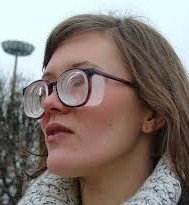
Some folks may want to hang onto their glasses for reasons other than eyesight. My eye doctor has a story about what he calls the John Denver effect, with a young patient wanting glasses even though she could see fine, so she’d look like her personal idol. I’ve also encountered female clients who don’t want to give up their glasses with expensive jewelry-like frames, which they think make them look glamorous.
Another reason to want glasses is for protection, especially if you suffered a childhood eye injury which glasses would have prevented, or the glasses you did wear then kept spray paint or flying objects out of your eyes and saved you from harm. It’s understandable why you’d feel safer with glasses with this history, but is this still a reason to wear them and separate your eyes from the world now?
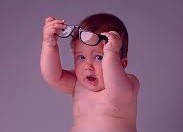
If I look back over my vision improvement path, I see that I wanted to get out of my glasses so badly, I made it harder on myself than it had to be. I’d wear my reduced prescription glasses to drive to the grocery store, then leave them in the car while I went inside to peer at the items on the shelves, often identifying what I wanted by the color of the packaging, since I couldn’t read the lettering unless I was a few inches away.
Glasses were The Enemy to me, all those stronger and stronger prescriptions when I was little which made me feel like I was in an ever-shrinking prison, and which I discovered later hadn’t fixed my vision at all. In fact they allowed it to get even more strained and for me to see even more poorly. I was determined to reverse this downhill slide, especially since I was healthy in all other aspects.
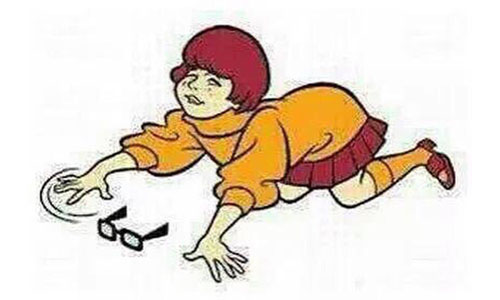
Today I don’t wear glasses, even though I can’t always see as clearly as I’d like to. When I encounter blur I proceed more slowly and take deep breaths to calm myself. Anxiety can worsen that destructive mental spiral of being afraid I won’t be able to see. I can’t honestly say I view glasses as a good thing in my life, though I would have been seriously handicapped as a child without them, at least until I learned to relax. And I am much more accepting of my past experience. Resentment, like anxiety, is not a healing attitude!
If you have eyeglasses, are you wearing them when they’re not needed, maybe just out of habit, or for one of the other reasons mentioned earlier? A glasses-free life is a pleasure, believe me, so much more natural and unencumbered and yes, free. When I was a child, if my fairy godmother happened to show up and grant me 3 wishes, my first would have been “fix my eyes!”. (My mother regularly worried about “Nancy’s bad eyes”.) I know now there was nothing wrong with my eyes at all.
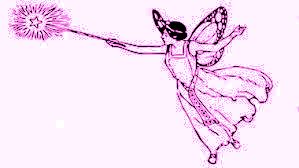
When I wore glasses, my obedient eyes were just doing the best they could to see through those thick lenses. Without that wall of glass altering the scenery before it gets into my eyes and makes its way to my brain, my good eyes are seeing more, and seeing it more clearly. What can you see without your glasses? Be safe, please, especially when driving. And maybe you don’t need your glasses as much as you think you do.
get help on our Facebook Group!

I wore strong glasses, then contact lenses, from age 5 into my 40s. While making many mistakes, eventually l learned how to improve the way I use my eyes and to see in a more relaxed, healthy manner. It is my pleasure to coach others to do the same. Visit me at https://NancyLNeff.com.
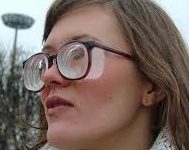
Hi Nancy,
As I was scrolling through your posts, I again saw this one, and have been wondering if the photo of the attractive lady in the header is you. If so what was your prescription at that time?
Hi Dale. No, this is not me, just a stock photo I found when I was searching for “thick eyeglasses”. She looks so resolute to me, determined to make her way through Life even with that burden. I just want to reach out and gently remove those “eye cages” and give her a hug!
I wore weak reading glasses for many years, and several years ago began doing extensive computer work, which resulted in becoming slightly myopic, -.75 in each eye.
The myopic correction is so much more comfortable than the reading prescriptions that I formerly had. I know that these glasses are not very strong, but I put them on first thing in the morning, and wear them until going to bed. I can’t say that my vision without them is terrible, but without them my eyes feel strained. At first they seemed so strong, and the images appeared so small, but so amazingly sharp.
I have had three exams in six years since getting them, and the prescription has remained the same, and the optometrist says that my vision without them has remained the same at 20/70. He said that I need them due to late adult onset myopia, and that the prescription will most likely remain the same, or perhaps increase very slightly.
Hi Dale! I’m glad your prescription hasn’t worsened, and that you feel comfortable with glasses. At first they seemed so strong because they were more than you needed. Then “your eyes got used to them” as the eye doctors always predict, straining to see through that prescription in front of them all day long. If you don’t mind the glasses, fine. If you do, I’d challenge you to do a few simple things without them without straining, and see how that feels. You can get used to no glasses again if you want that. Thanks for writing. 🙂
Thank you for the reply Nancy.
I never discussed this with the Optometrist, but have always wondered if I had been myopic all of the years that I wore reading glasses. The reason being that my Initial complaint had been distance blur when, and after doing any reading. This went on for about twenty years, and during that time I never had an eye exam.
The first Optometrist that I went to gave me reading glasses, and when I complained that they did not help, he said to wear them full time. I then went to several other Optometrists with the same complaint, but did not tell them that glasses had been prescribed.
Each one prescribed a little different reading prescription, most of them stronger, and some with astigmatism correction included.
Then one of them gave me bifocals, and even though they helped slightly, I never wore them on a regular basis. Eventually the problem of distance blur did go away. However the glasses never felt comfortable, or gave me crisp vision, like my present glasses do. The best description for these glasses is that they give me high definition vision, where as the bifocals only enlarged images, and they were not sharp images.
Then when I went to this present Optometrist, I did not show him the glasses that I had been wearing, because they really were not helping at all, and I wanted to get a fresh opinion.
It was always in the back of my mind, that I was myopic, and corrected with the wrong glasses.
Now, I am wondering if the reason that my present prescription felt so strong is that since I had been wearing a prescription of + 2.25, and a bifocal add of + 1.00, that my eyes really have made a mathematical adjustment toward myopia of – 3.00
Dale, I’m not an eye doctor and can’t prescribe glasses. Yet it makes pefect sense to me that distance blur after a long time of reading is from your eyes being temporarily accomodated to see up close, and the distance vision (maybe your “weak spot”?) needs a bit of time to come back on-line. It does not mean to me that you need reading glasses! I’m glad you’ve found a solution which works for you, and remember, vision varies, and will adapt to whatever glasses you put in front of your eyes. Including no glasses at all. I’m guessing having no distance correction for so long, and straining to see in the distance, might have made your myopia worse than it would have been otherwise. Anyway, here you are now, knowing more than you used to, so go forward from here. See well and be well!
Hi again Nancy, I took up your challenge and began going without my glasses. At first it was really difficult, because things at any distance were blurred. Then it seemed a bit better especially doing close work, or on the computer. After a month I was not wearing glasses at all, but I knew my vision was not good. Then I noticed that things seemed more blurred than previously, so I thought that perhaps I should wear the glasses for distance. To my surprise, after only about three months without glasses, that now they seemed to not help with distance at all. I had an exam last week, and was told that my eyes had now gone from 20/70 to 20/200. The new glasses are -2.25 for each eye, and vision is very sharp with them. The only thing is that when doing close reading, and computer work, images appear so small. The doctor suggested to wear the glasses a few weeks, and if I am not comfortable, that he could give me a small bifocal, or weaken the prescription a bit for distance, and give me a bit more in about six months. When I mentioned that I had been going without glasses, he indicated that may be why the prescription increased so much. He was a little surprised that it had increased. Do you think that going with a weaker prescription
would be better than wearing a bifocal prescription? My thought is that wearing the stronger lenses may be better in the long run. He did mention that he could have actually prescribed a bit more minus, but that I most likely would have trouble adjusting to it. He also said that my previous -.75 lenses were an undercorrection, but that I was doing well with them, especially since I was wearing them for both distance, and near. Given my history , do you think that I could ever get back to good vision without glasses?
Hello Dale. First, I am not an optometrist so I cannot prescribe glasses. I can give you my thoughts from the benefit of my own experience lowering my high prescription, working with clients doing the same, and constantly educating myself about natural vision improvement. First, I think you know vision varies — it can be as dynamic as your attitude. 🙂 If you go to the eye doctor when your energy is slumping, he’ll say you “need” a higher prescription than you would otherwise, and if you get those stronger glasses and wear them a lot, yes, your eyes will adjust and you really will need them to see clearly.
The loose guideline is to wear the lowest correction which helps you see well enough to feel safe. You may need glasses at night to drive and not in the daytime, for example. I wouldn’t abandon the weaker glasses right away, as they may be all you need in some situations. Notice whether you’re straining to see, at either distance or near, and see what you can do to relax your brow, shoulders, face, etc., breathing fully and gently, before you reach for the stronger glasses. A lot of this work is learning how to welcome the sight that wants to come to you, not grab for it or resist it.
The eye doctor is trying to help, but what he knows is to give you a prescription, which may not be what you need in all cases. Trust your good eyes, which already know how to see.
Hello again Nancy,
I had been trying to go without my -2.25 glasses, but was not comfortable doing so.
I have located a behavioral Optometrist, that works with a Dr.Edward Friedmans Vision Training Program that was developed in the early 1980’s.
He started me off with a full vision exam, and refraction, and determined that my -2.25 glasses were still good, but that there was some uncorrected astigmatism.He prescribed some additional nearsighted correction, instead of the cylinder correction that would normally be used for the astigmatism. This now makes the new glasses a prescription of -3.00 for each eye.
He had me wear the new glasses for two weeks, for all activities near, and distant. Now he has me doing eye exercises, some of which are done first with, and then without the glasses. After a few weeks he feels that I may be able to do better without the glasses for some activities.
He is not sure if I will be able to attain 20/20 without glasses, but feels that he will be at least able to get me into weaker prescriptions, as we proceed.
So far I have not really seen any real improvement using a Snellen chart at home, and still fell really dependent on the glasses.
Dale, as I’ve said, I’m not an eye doctor. If your eye doctor’s goal is to get you into weaker prescriptions, I like that. Trying to do without glasses completely when you’ve worn them for a long time doesn’t work for everyone — it’s usually better to lower the prescription for some activities where you really need to see clearly, like at the computer or when driving, then do other activities without any correction if you’re safe. I don’t like that the doctor wants you to wear the new glasses for everything, but follow doctor’s orders for now. Maybe he’s trying to get your brain to really learn what clarity is. And monitor how your eyes and vision feel. Strain is a no-no, and relaxation and clarity are the goal. Good luck! 🙂
Hi Nancy.
It has been about two years since my last post. I just wanted to let you know the final outcome regarding my work with the behavioral optometrist.
Long story, but through exercises, and prescription changes I went from – 3.00 lenses all the way to – .75 for each eye, and uncorrected vision of 20/70. The only downside is that with the glasses my best vision is 20/30. I can see the 20/25, and 20/20 line fairly clear, but the letters are too small to discern. Consequently I wear the glasses all the time, and even need them for reading, because without, the print is very fuzzy, but with the glasses it is sharp.I suspect that this is due to the prior astigmatism, which most likely is there, but not as much as it was.
I am finished working with the optometrist, but he suggested that I try on my own to get used to a -.50 prescription. I have a pair of glasses in this prescription, but it is amazing that with that small of a difference, my distance vision is usually reduced to not seeing the 20/25 line except for what looks like a smudge, and the 20/20 line is not distinguishable.
I feel that although I still need glasses full time that I have made great progress.
Hi Dale, and thanks for the update.You have indeed made great progress, so good for you! Your work with the behavioral optometrist has clearly paid off. Yet I would challenge your statement that you need your glasses full time. The world is not an eye chart! Could you go for a walk without your glasses, for example? It’s up to you. I was so eager to be free of glasses myself that I often dealt with some blur rather than put on those restrictive devices. And that may not be your focus, if you’re totally happy with where you are now. In any case, thanks for getting in touch. I’m happy for you that you have had such significant improvement. Take care, and enjoy your wonderful eyesight! 🙂
Hi again Nancy,
Thank you once again for your kind words and encouraging suggestions.
I have tried your suggestion of walking without glasses. At first I tried in the area that I live, but to much traffic, so I had to put the glasses on. I then went to the local mall, and it was interesting. The walking is not a problem, but the signs, store fronts, and peoples faces are so blurred.
I contacted my behavioal optometrist, and explained this to him, and ask if he thinks that my vison could clear up if I continue the walking.
He explained to me that the -.75 glasses are not really a correction for myopia, but rather a sphereical equivilent correction for a lenticular astigmatism of slightly more than – 1.50 in each eye. That is why without the glasses, distance, and reading is blurred, and why the distance vision with -.50 glasses are so much worse. He said it may be helpful to continue the walking, but is now thinking that the -.50 glasses should only be worn for close work, and the -.75 for all other activities.
In you experiences did you have any astigmatism?
Again thank you for the suggestion.
Dale
Hi Dale. Good for you for experimenting with walking without glasses. The good news is that you didn’t walk into any walls 🙂 so you’re not helpless without glasses which is good to know. You found that you can’t read signs or decipher faces very well, which is good information. Now you know where you still need improvement.
About me, my myopia was so high when I started almost 25 years ago, -10 under-corrected, that my -1.75 astigmatism didn’t feel like much of a factor in my blur. My behavioral optometrist took me out of my hard contacts and gave me soft ones with no astigmatism correction, and I started slowly improving. I was so used to blur that any decrease in blur was a treat. The eye doctors’ practices and recommendations may be different now. I do know many eye doctors are recommending different corrections for close work than for distance. You probably know children using their distance glasses for all distances, especially for close-up with their screens, is a pretty sure road to increasing myopia and stronger distance glasses. This was my story.
Back then I was so resistant to glasses that I did as much as I possibly could without them, even if things were blurry, and very quickly read without any correction at all, just holding the material closer at first. I encourage you to do what you can without glasses, safely and without strain, and observe yourself. Ask yourself if you really need your glasses before you put them on, just like you did when walking outside.
One more point: you probably know astigmatism is often accompanied by a twisted or off-center body or head posture. I’ve been paying a lot of attention lately to my body alignment and balance. My neck is looser than I can ever remember, and my vision feels more balanced too. Like hygiene or other personal care practices, vision care and improvement is an ongoing process. I’m glad you have a trusted optometrist to work with and support you. Please keep me posted about your progress.
Hello! Just happened on this blog. Wonderful info. and good food for thought! Went on my run outside yesterday without glasses and although street signs were blurry, it was freeing and terrific. This morning I can make do just fine with my old regular readers. Going t experiment more with your suggestions. Peace!
Hi Gina, and good for you! You made my day. 🙂 When I think of seeing without eyeglasses, “freedom” is the 1st word that comes to mind. Gently welcome the details as you scan the environment, and send gratitude to your precious eyes and brain. Keep up the good work!
From what I can remember, until about age 13 or 14 I never questioned *anything* authorities said, said about me, or did to/with me (this last item sounds more ominous than I want it to sound). My needing glasses at around age 5 fit right in there with my feet being all askew, my general anxiety, my dropping things all the time, my almost constant stomach ache etc. I was just ‘not quite okay’ (I felt) in comparison to anyone around me.
Nevermind that many ‘authorial’ proclamations were quite contradictory (in themselves, and in contrast to other authorities). Surely I was just too stupid to understand what they really meant. At any rate, their facial expressions and demeanor told me that it must be so … (Was I glad when, a few years ago, I stumbled across the concept of ‘double bind’ that helped me articulate my experience and put it into a broader perspective.)
Its all connected of course …
Thankfully, my best friend of 40 years keeps reminding me of the following: Some years ago – I don’t remember the exact context – I apparently kept emphasizing again and again how utterly helpless I would be should I break my glasses or lose my contacts when ‘out in the world’. This, he says, is in such stark contrast to my now telling him that I went for a walk in the park, or shopping, or even into town, without my glasses on. I hear him, and agree, but aren’t quite able to (emotionally) ‘integrate’ this apparent massive change (in attitude also) yet. Well, sometimes a little.
Thank you, Nancy, for a very helpful, thought-inspiring post!
A vision journey has a starting point; as a vision educator I have met many who have been totally dependent on glasses since primary school for decades, never been able to drive without glasses restore there clarity of focus to pass the drivers eyesight exam; BUT NOTE have also never tried managing without there glasses even for a short while. Restoring the natural process requires many to relax in a technique that works for them. There are many professional men out there who hardly need to wear glasses but feel there image is more intellectual, so get listened to! A starting point includes blinking deliberately, checking what you can see without optical aids… introducing palming and sunning to gently push the focusing boundaries. The stressful examination schooling years may leave you with a really great career path a feeling of achievement. The optical corrections set up fixed muscular activity only loosened restored with periods of being with out glasses. The response time varies with individuals and commitment to make a change. So with the principles understood and experience of returning clearer vision, practice is possible with and without glasses until there is discomfort with an old prescription. Glasses do protect eyes – as a kid i often got steam engine soot in my eyes sticking my head out of the carriage window, and as a furniture craftsman. But got a bloody eye by a pine needle winging at me unexpectedly. Blinking deliberately enhances the automatic reflex for self protection at an unbelievably fast reaction > 75/sec. Our eyes were also designed to extremes of light included in peripheral vision which require practice – not sunglasses by default.
Christopher, thanks for your thoughts, and I agree with everything you said.
Hi Roman, and thanks! One of my favorite things to hear is that I led you to think. 🙂 For myself and others I’ve met who were put in strong glasses at a young age, that trapping of the eyes also seems to have trapped some natural healthy rebelliousness, restricting the questioning of authority just like it restricted the free movement of the eyes. Then as an adult we look back and may think we were mistreated, but most adults really did want to help us the best way they knew how. And now as adults ourselves it’s our job to help ourselves, knowing more than our childhood authorities did. Of the many areas in my life where I’ve learned and grown, vision improvement has been both the most frustrating and also the most satisfying.
[…] https://www.iblindness.org/5177/how-do-you-feel-about-your-glasses/ […]